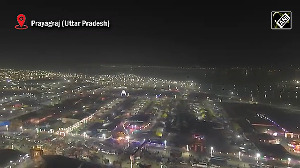If confirmed by the Centre, considered a formality, Gogoi will be sworn in on October 3, a day after Misra retires.

Putting to rest all speculation, Chief Justice of India Dipak Misra on Tuesday recommended to the centre that Justice Ranjan Gogoi be his successor, eight months after he was part of a revolt against the country's top judge.
Despite the differences, Misra stuck to convention and recommended Gogoi, the senior-most judge in the Supreme Court after the CJI.
If confirmed by the Centre, considered a formality, Gogoi will be sworn in on October 3, a day after Misra retires.
Highly placed sources said the letter by Misra has been sent by the office of the CJI to the ministry of law and justice for necessary action.
Gogoi will have a tenure of little over a year.
His term is due to end on November 17 next year when he attains the age of 65.
Misra's recommendation is in line with the tradition that the senior-most apex court judge succeeds the incumbent CJI on his retirement.
Speculation over Misra's recommendation on the next CJI arose after the court's four most senior judges -- Justices J Chelameswar (since retired), Gogoi, Madan B Lokur and Kurian Joseph -- had called an unprecedented press conference in Delhi on January 12 this year and criticised him on several issues, especially the manner of allocation of cases to certain benches.
The recommendation came after Law Minister Ravi Shankar Prasad recently asked Misra to recommend his successor, setting in motion the process of a change of guard at the apex court.
Gogoi, who is set to become the 46th CJI, was elevated to the apex court on April 23, 2012.
He has been part of several key verdicts and is presently seized of sensitive cases including the finalisation of National Register of Citizens in Assam and the PIL seeking appointment of a search committee members to select Lokpal.
According to the memorandum of procedure, which governs the appointment of members of the higher judiciary, "appointment to the office of the Chief Justice of India should be of the senior-most judge of the Supreme Court considered fit to hold the office".
It stipulates that the law minister will, at an appropriate time, seek the recommendation of the outgoing chief justice of India for the appointment of his successor.
Under this process, after receiving the CJI's recommendation, the law minister puts it before the prime minister who advises the president on the matter.
"Whenever there is any doubt about the fitness of the senior-most judge to hold the office of the Chief Justice of India, consultation with other judges...would be made for appointment of the next Chief Justice of India," the document states.
The law minister recently said the government's intention on the appointment of the next Chief Justice of India should not be questioned.
He had also said the Executive will take a call when the incumbent names the senior-most judge of the Supreme Court as his successor as per convention.
Gogoi was part of a five-judge Constitution bench which, by a majority of 3:2, had dismissed the plea of P A Sangma challenging the election of Pranab Mukherjee as President in 2012.
In a first of its kind incident in the judicial history of independent India, a Gogoi-led bench had issued the suo motu contempt notice against former judge Markandey Katju, for his blogs containing comments on the judges.
Later, Katju apologised.
In a landmark verdict, a bench headed by Gogoi held in 2015 that government advertisements could only include photographs of the prime minister, the president and Chief Justice of India, a measure to ensure that politicians in power could not use taxpayers money to gain political advantages.
Gogoi was also heading the bench which struck down a law in Uttar Pradesh which allowed former chief ministers to retain official accommodations even after demitting office.
This verdict led leaders like Rajasthan Governor Kalyan Singh, Union Home Minister Rajnath Singh, Bahujan Samaj Party supremo Mayawati and father-son duo, Mulayam Singh Yadav and Akhilesh Yadav to vacate their bungalows in posh localities of Lucknow.
Gogoi was also part of the seven-judge bench led by then CJI J S Khehar which, for the first time, took to task rogue elements in higher judiciary.
The bench had held C S Karnan, the then judge of the Calcutta high court, guilty of contempt and gave him a six-month jail term.
Karnan had alleged corruption in the highest levels of the judiciary, as well as caste discrimination against him.
He also held that the seven judges hearing his contempt case guilty of offences.
Gogoi, son of Keshab Chandra Gogoi who was the chief minister of Assam, had joined the legal profession in 1978 and was appointed as permanent judge of the Gauhati high court on February 28, 2001.
Later, he was transferred to the Punjab and Haryana high court on September 9, 2010 where he became the Chief Justice on February 12 next year.










 © 2025
© 2025